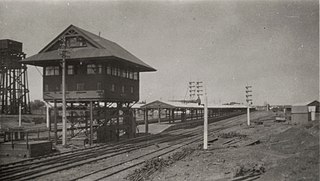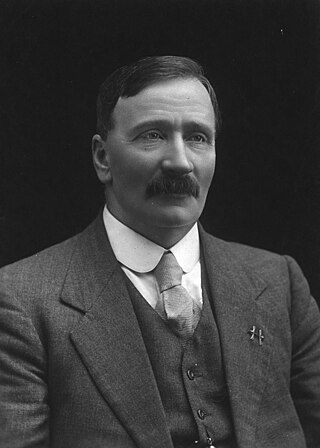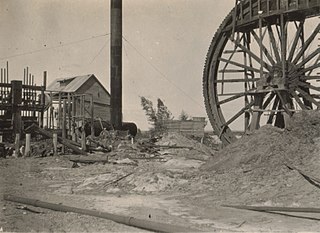Related Research Articles

Coolgardie–Esperance Highway is a 370-kilometre (230 mi) Western Australian highway between Coolgardie and Esperance. It runs in a north–south direction linking the state's Eastern Goldfields to the coast.

Kalgoorlie railway station is the easternmost attended station in Western Australia, located at the eastern terminus of the Eastern Goldfields Railway. It serves the city of Kalgoorlie. Beyond Kalgoorlie, the line continues east as the Trans-Australian Railway.
The Western Argus was a newspaper published in Kalgoorlie, Western Australia, between 1894 and 1938.

George James Foley was an Australian politician from Western Australia. He was the member for the Western Australian seat of Mount Leonora from 1911 until 1920, initially for the Labor Party until 1917 when he joined the National Labor Party. He then entered the Federal House of Representatives as the Nationalist member for the seat of Kalgoorlie, which he held until 1922.

Henry Gregory was an Australian politician. He was a Ministerialist member of the Western Australian Legislative Assembly from 1897 to 1911, representing the electorates of North Coolgardie (1897-1901) and Menzies (1901-1911). He was state Minister for Mines from 1901 to 1904 under George Leake and Walter James and Minister for Mines and Railways from 1905 to 1911 under Hector Rason, Newton Moore and Frank Wilson. He rose to become Treasurer from 1910 to 1911, a role that also entailed him acting as Premier if Wilson was absent, but lost his seat at the 1911 state election.
Broad Arrow is a ghost town in Western Australia, located 38 km north of Kalgoorlie and 633 km east of Perth. It is on the Kalgoorlie to Leonora Road.

Comet Vale is an abandoned town in Western Australia located in the Goldfield region of Western Australia located between Kalgoorlie and Laverton on the Goldfields Highway. It is within the Shire of Menzies.
State Batteries in Western Australia were government owned and run ore-crushing facilities for the gold mining industry. Western Australia was the only Australian state to provide batteries to assist gold prospectors and small mines. They existed in almost all of the mineral fields of Western Australia.

Charles Henry Roland was an Australian rules footballer who played with Carlton in the Victorian Football League (VFL).
Jabez Edward Dodd was an Australian politician. He was a member of the Western Australian Legislative Council from 1910 until his death, representing South Province. He was elected as a member of the Australian Labor Party, but left the party in the 1917 Labor split and represented the Nationalist Party thereafter.
George Bennetts was an Australian politician. He was an Australian Labor Party member of the Western Australian Legislative Council from 1946 to 1965, representing South-East Province.
Robert Joseph Boylen was an Australian politician. He was an Australian Labor Party member of the Western Australian Legislative Council from 1947 until his death, representing South Province (1947–1950) and South-East Province (1950–1955).

The Town of Kalgoorlie was a local government area in Western Australia, centred on the town of Kalgoorlie.
The Bulong Road District was an early form of local government area on the Western Australian goldfields. It was formally established on 20 December 1899, providing a basic form of local government to the rural areas around the mining town of Bulong, which had already incorporated as the Municipality of Bulong in 1896. However, it took several months before the road board had practically established itself, and in March 1900 the Kalgoorlie Sun wrote: "...a roads board has been gazetted for Bulong, all on its own. But now they have their roads board, they don't know what to do with it." The first road board election took place on 3 April 1900. The road board met at the municipality's office, the council chambers, in Bulong township.
The Norseman Road District was an early form of local government area on the Western Australian goldfields.
The Eastern Goldfields Trades and Labour Council was a trades and labour council (TLC) based in the Eastern Goldfields of Western Australia.
The Municipality of Broad Arrow was a local government area in Western Australia centred on the mining town of Broad Arrow.
The Municipality of Broad Arrow-Paddington was a local government area in Western Australia centred on the mining towns of Broad Arrow and Paddington.
The Municipality of Bulong was a local government area in Western Australia centred on the mining town of Bulong.
Sir Richard Greenslade Moore was an Australian politician who served as Mayor of the Municipality of Kalgoorlie between 1937 and 1966. He was a member of the Western Australian Legislative Council between 1932 and 1936.
References
- 1 2 3 4 "Charles George Elliott". Members’ biographical register. Parliament of Western Australia. Retrieved 11 January 2020.
- ↑ Leslie, W. D. and Holland, A. J. "Tribute Agreements" (PDF). AMPLA Bulletin. 1.
{{cite journal}}: CS1 maint: multiple names: authors list (link) - 1 2 3 "MR. C. G. ELLIOTT DEAD". Western Argus . Western Australia. 29 March 1938. p. 8. Retrieved 11 January 2020– via Trove.
- 1 2 "LATE MR. C. G. ELLIOTT". Kalgoorlie Miner . Western Australia. 25 March 1938. p. 4. Retrieved 11 January 2020– via Trove.
- ↑ "NORTH-EAST PROVINCE ELECTION". Western Argus . Western Australia. 18 October 1932. p. 10. Retrieved 11 January 2020– via Trove.
- ↑ "VICTORY FOR TRIBUTERS". The Advertiser (Adelaide) . South Australia. 24 November 1932. p. 8. Retrieved 11 January 2020– via Trove.
- ↑ "PROSPECTORS' ASSOCIATIONS". The West Australian . Western Australia. 19 July 1937. p. 16. Retrieved 11 January 2020– via Trove.
- ↑ "GOLDFIELDS IDENTITY". The West Australian . Western Australia. 24 March 1938. p. 20. Retrieved 11 January 2020– via Trove.
- ↑ "LATE MR. C. G. ELLIOTT". Western Argus . Western Australia. 29 March 1938. p. 32. Retrieved 11 January 2020– via Trove.
- ↑ "COUNCIL BY-ELECTION". Western Mail . Western Australia. 29 March 1934. p. 14. Retrieved 11 January 2020– via Trove.
- ↑ "MRS. C. G. ELLIOTT, M.B.E." Sunday Times (Perth) . Western Australia. 5 January 1936. p. 7. Retrieved 11 January 2020– via Trove.
- ↑ "Surprise Nomination". Kalgoorlie Miner . Western Australia. 11 November 1946. p. 1. Retrieved 11 January 2020– via Trove.